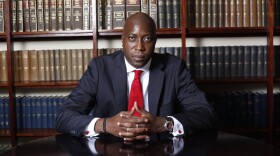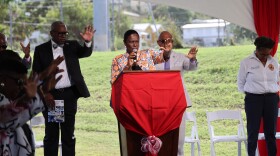ST. CROIX — Panelists reflected on the legacy of Brown v. Board of Education today at the University of the Virgin Islands during an event attended by high school students that was held in observance of the 70th anniversary of the U.S. Supreme Court’s unanimous landmark decision that made racial segregation illegal in public schools on May 17, 1954.
UVI’s College of Liberal Arts and Social Sciences hosted the fireside chat in partnership with the District Court of the Virgin Islands and the UVI School of Education, providing “an opportunity to reflect on the legacy of Brown v. Board of Education and its enduring relevance in today’s society,” according to Kimarie Engerman, CLASS dean.
“It is our hope that through open dialogue and critical examination, this fireside chat in observance of the 70th anniversary of this historic case in U.S. history will foster a deeper understanding of the complexities surrounding educational equality and inspire meaningful action towards a more just and inclusive future,” Engerman said in a statement.
The discussion was primarily held between two panelists and a moderator in the Evans Center, Suite 401, also known as the Little Theatre, at UVI’s Albert A. Sheen Campus on St. Croix. One panelist also participated from UVI’s Orville E. Kean Campus on St. Thomas via a Zoom call that was projected on a wall-sized screen in the Little Theatre.
Engerman thanked freshmen and seniors in attendance from St. Croix Central High School and St. Croix Educational Complex High School for choosing to participate in the discussion.
“Brown v. Board of Education has made a significant impact on the landscape of education in our country, the United States,” she said, noting Brown v. Board of Education also impacted the Virgin Islands through the Hosier v. Evans case, a landmark District Court of the Virgin Islands decision from 1970 that allowed immigrant students to attend public schools for the first time.

Engerman said it was fitting for the conversation to be had on the Albert A. Sheen Campus because Sheen was the attorney who argued the case of Hosier v. Evans.
Ericka Hansen, who teaches VI history at CHS and serves as the school’s department chair for social studies, said it was important to bring students to participate in the discussion so they could understand what the Brown v. Board of Education case was all about.
“The reason I brought the students out today is because I think it would be quite beneficial for them to understand the case and how hard students had to go through segregation, and the different hardship that they had to go to school that offered them the necessary quality education, because many students that looked just like them had to drive 200 to 300 miles in order to get to school,” she said.
Yadayyah Leo, 15, a freshman at Complex, said the event was “informative.” She discussed her participation in a question-and-answer segment.
“I asked a second question about how we actually have fought to be desegregated but now we are essentially wilfully segregating ourselves within our own institutions due to the racial impulses and biases that are still apparent in our institutions, so I honestly loved this conversation, loved this seminar, and I feel like it left all of us with chunks of knowledge,” she said. “It was really nice.”
Keanna Alphonse, 18, a senior at Complex, said the discussion was an eye opener about how society still has imperfections that need to be improved upon. She said she learned about segregation, how there was a major change, and how society could continue changing in the future.
“I think it’s beneficial because it’s teaching me that as an individual, or a young adult that I, myself, have to open my voice,” she said. “I have to put myself out of that comfort zone to be able to say, ‘well, we are not segregated,’ because at the end of the day, we’re all humans. No matter our skin tone, we all bleed the same. And with that benefit, I would go on into the world to be able to spread the word about, you know, segregation isn’t needed, and we are all empowered in our own unique and different ways.”
Diana Garcia, department chair for social studies at Complex, said the panel discussion went well, noting it was appropriate for the high-school level.
“We accepted the invitation because we feel that this was a very important case for our kids to know about,” she said.
As the moderator, U.S. District Court Magistrate Judge Emile Henderson III, engaged the panelists, the discussion focused on the strategy behind having a Black man who was a reverend, Oliver Brown, as the lead plaintiff in the class-action suit against the Board of Education of Topeka, Kansas after his daughter was denied entrance to an all-white elementary school. It also focused on the fact that Brown v. Board of Education overturned Plessy v. Ferguson, a Supreme Court case from 1896 that advanced the controversial “separate but equal” doctrine for assessing the constitutionality of racial segregation laws.
“It is really a decision that is of major importance for our nation as to where we were then, and to where we’re going now,” Henderson said.

U.S. District Court Magistrate Judge Ruth Miller, who served as the panelist on St. Thomas, discussed the process of how the Brown v. Board of Education case moved through the justice system to the U.S. Supreme Court after being filed in District Court in Topeka. The moderator primarily questioned the two St. Croix panelists — Attorney Tanisha Bailey-Roka, Virgin Islands Supreme Court chief disciplinary counsel; and Aesha Duval, District Court librarian.
At one point, the panelists discussed repercussions that came after the Supreme Court ruled that state laws establishing racial segregation in public schools were unconstitutional because they violated the equal protection of the laws guaranteed by the 14th Amendment. While summarizing what happened in the country after the Supreme Court’s ruling, Bailey-Roka described the situation as “social backlash.”
“Black people were terrorized in this country,” she said. “They had crosses burned on their yards to intimidate them. You had whole school systems, Prince George’s County in Maryland, shut down.”

Bailey-Roka said the southern states did not accept the court’s ruling in favor of equality. She further discussed how the backlash fueled more social change.
“The blessing in the backlash is that it led to the civil rights movement,” she said. “It was one of the things that fed the civil rights movement. And there we have, ultimately, the Civil Rights Act, so it was backlash and blessings.”















